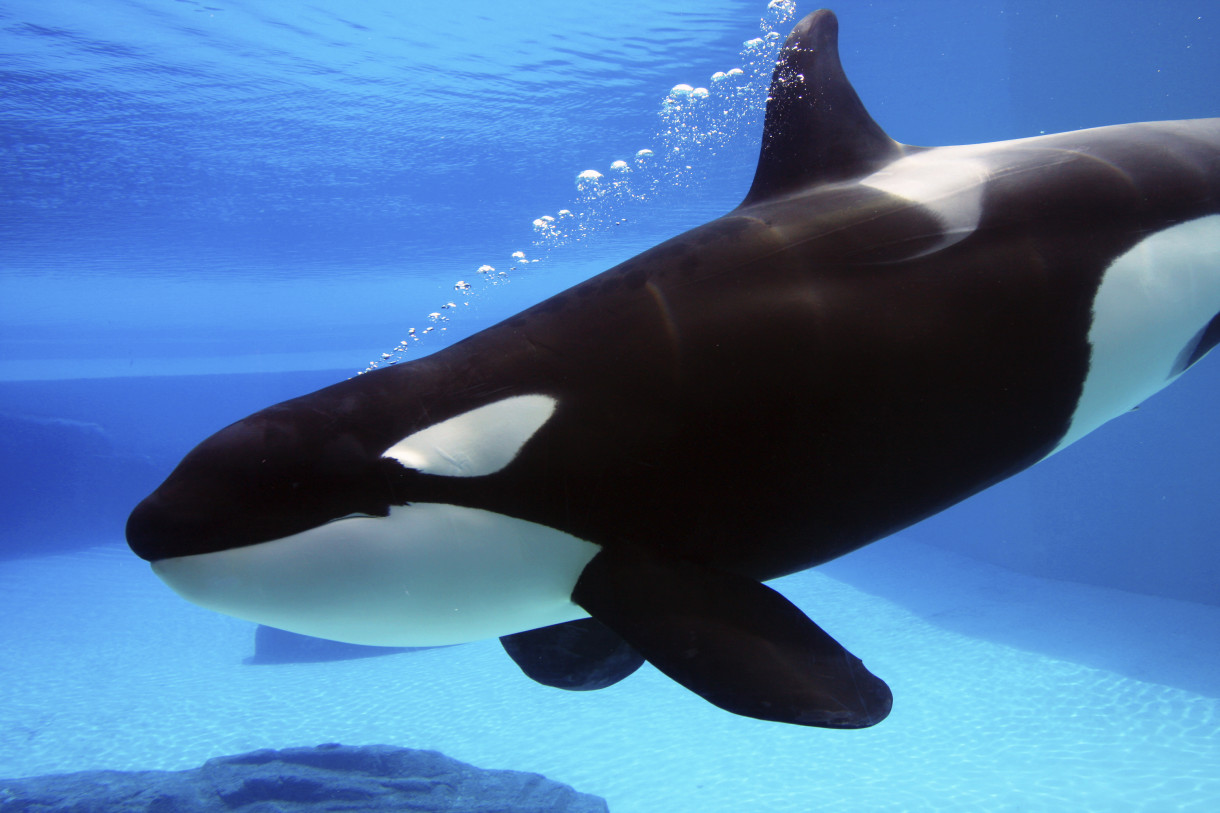

Captive killer whale. Image via Humane Society.
Killer whales display personality traits similar to those of humans and chimpanzees, such as playfulness, cheerfulness and affection, according to research published in the peer-reviewed Journal of Comparative Psychology on November 15, 2018.
The 2019 lunar calendars are here! Order yours before they’re gone. Makes a great gift.
Researchers in Spain analyzed the personality traits of 24 captive killer whales (Orcinus orca) at SeaWorld Orlando, SeaWorld San Diego and the Loro Parque zoo in Tenerife, Spain, which operates its killer whale program in partnership with SeaWorld. Six of the killer whales were caught in the wild while the remainder were among of the last killer whales to be born in Seaworld’s now-defunct killer breeding program. SeaWorld’s breeding program ended in 2016 after the company came under fire for its treatment of killer whales. Previous research with captive killer whales showed that captivity can alter the personality of killer whales, increasing neuroticism and aggression. Physical changes, such as dorsal fin collapse, also have been observed.
Researchers involved in the current study said they conducted their work with captive killer whales because of the difficulty of trying to assess personality traits of killer whales in the wild.
They noted that the personality traits observed in this small sample size of captive killer whales – whose personality traits appeared similar to those of humans and chimpanzees – could differ from the personality traits of killer whales in the wild.
Trainers and other staff who worked closely with the killer whales completed surveys ranking each animal on a list of 38 personality traits, including playfulness, independence, stubbornness, bravery, sensitivity and protectiveness. Those traits were analyzed and compared with previous studies of the same personality traits for chimpanzees and humans. Read more about how to researchers conducted the study here.
Lead researcher Yulán Úbeda is a doctoral student in psychology at the University of Girona in Spain. Úbeda said in a statement:
These similar personality traits may have developed because they were necessary to form complex social interactions in tightly knit groups that we see in killer whales, humans and other primates.
Killer whales in the wild can live into their 90s, in tightly knit pods that hunt together and share their food, displaying advanced communication skills and cooperation.

Killer whale in the wild, playing with a block of ice. Image via Wikipedia.
Researchers found that the personality traits of killer whales were similar to those of both humans and chimpanzees, but more similar to chimpanzees. According to the researchers:
…Killer whales were similar to chimpanzees and humans for the extraversion factor (e.g., playful, gregarious and sociable). Killer whales and chimpanzees also shared a combination of personality traits for conscientiousness (e.g., constant, stubborn and protective) and agreeableness (e.g., patient, peaceable and not bullying), along with some personality traits relating to dominance.
Bottom line: A new study suggests that killer whales share some personality traits with humans and chimps.
Via American Psychological Association
from EarthSky https://ift.tt/2Pyz6BY


Captive killer whale. Image via Humane Society.
Killer whales display personality traits similar to those of humans and chimpanzees, such as playfulness, cheerfulness and affection, according to research published in the peer-reviewed Journal of Comparative Psychology on November 15, 2018.
The 2019 lunar calendars are here! Order yours before they’re gone. Makes a great gift.
Researchers in Spain analyzed the personality traits of 24 captive killer whales (Orcinus orca) at SeaWorld Orlando, SeaWorld San Diego and the Loro Parque zoo in Tenerife, Spain, which operates its killer whale program in partnership with SeaWorld. Six of the killer whales were caught in the wild while the remainder were among of the last killer whales to be born in Seaworld’s now-defunct killer breeding program. SeaWorld’s breeding program ended in 2016 after the company came under fire for its treatment of killer whales. Previous research with captive killer whales showed that captivity can alter the personality of killer whales, increasing neuroticism and aggression. Physical changes, such as dorsal fin collapse, also have been observed.
Researchers involved in the current study said they conducted their work with captive killer whales because of the difficulty of trying to assess personality traits of killer whales in the wild.
They noted that the personality traits observed in this small sample size of captive killer whales – whose personality traits appeared similar to those of humans and chimpanzees – could differ from the personality traits of killer whales in the wild.
Trainers and other staff who worked closely with the killer whales completed surveys ranking each animal on a list of 38 personality traits, including playfulness, independence, stubbornness, bravery, sensitivity and protectiveness. Those traits were analyzed and compared with previous studies of the same personality traits for chimpanzees and humans. Read more about how to researchers conducted the study here.
Lead researcher Yulán Úbeda is a doctoral student in psychology at the University of Girona in Spain. Úbeda said in a statement:
These similar personality traits may have developed because they were necessary to form complex social interactions in tightly knit groups that we see in killer whales, humans and other primates.
Killer whales in the wild can live into their 90s, in tightly knit pods that hunt together and share their food, displaying advanced communication skills and cooperation.

Killer whale in the wild, playing with a block of ice. Image via Wikipedia.
Researchers found that the personality traits of killer whales were similar to those of both humans and chimpanzees, but more similar to chimpanzees. According to the researchers:
…Killer whales were similar to chimpanzees and humans for the extraversion factor (e.g., playful, gregarious and sociable). Killer whales and chimpanzees also shared a combination of personality traits for conscientiousness (e.g., constant, stubborn and protective) and agreeableness (e.g., patient, peaceable and not bullying), along with some personality traits relating to dominance.
Bottom line: A new study suggests that killer whales share some personality traits with humans and chimps.
Via American Psychological Association
from EarthSky https://ift.tt/2Pyz6BY

Aucun commentaire:
Enregistrer un commentaire